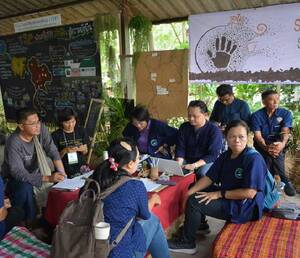Strengthening the CESRA network

Project Symbol: TCP/THA/3703
Strengthening the CESRA network and activities in Asia region for sustainable soil management
Over 80 percent of Afghanistan’s population lives in rural areas, where the main income comes from agricultural production. On-farm management practices are often highly extensive, putting the country’s soils under intense pressure and causing various types of degradation. Available data on Afghanistan’s soils are limited and earlier soil surveys have lacked a systematic approach and standardized methods. Sustainable soil management requires systematic soil data collection through field surveys and the continuous monitoring of soil properties organized into an appropriate data base and soil information system (SIS). The creation of such a system, providing accurate and up-to-date soil information, is thus a high priority, as it will enable sustainable land management at farm level and assist in the efficient monitoring of land degradation processes. Once in place, the Afghanistan Soil Information System (AfSIS) will contain data and information relating to the spatial variability of soil types and soil properties integrated with such natural co-variables as climate, vegetation, geology, relief conditions, hydrology and hydrography. It can be continuously upgraded and extended with new information from the field and will serve as a reference centre for storing all valuable soil data. The aim of the project was to identify, collect, evaluate, synchronize and systematize existing soil and non-soil data into a geodatabase integrating the various data sets. The data stored will enable the application of digital soil mapping (DSM) tools and models for the prediction of spatial distribution of soil properties, the identification of possible threats and pressures, risk assessment and the implementation of measures to mitigate soil degradation processes. The project would also strengthen the technical capacities of the country’s soil science community in the conduct of systematic and standardized field and laboratory soil properties analyses.
BACKGROUND INFORMATION
The project aligned with the CPF Outcome 3: Enhancing sustainable natural resources management, output 3.1 and indicator 3.1.1, which is FAO project to support the establishment and the activities of the Center of Excellence for Soil Research in Asia (CESRA) also promote implementation of ASP framework, especially on the pillar 3, and pillar 5.
Priority 3: Increase the competitiveness of the agricultural sector with technology and innovation, in 3.3. Develop research and information to commercialize, public relation and link the information network in international level and outcome is technology and innovation research are developed to lead to utilization.
Regional Initiative/Priority Area: RAP Regional Priority Areas: Enhancing equitable, productive and sustainable natural resource management and utilization.
Actual EOD: 1 November 2019
Actual NTE: 31 October 2020
Total Budget: USD 150, 000
